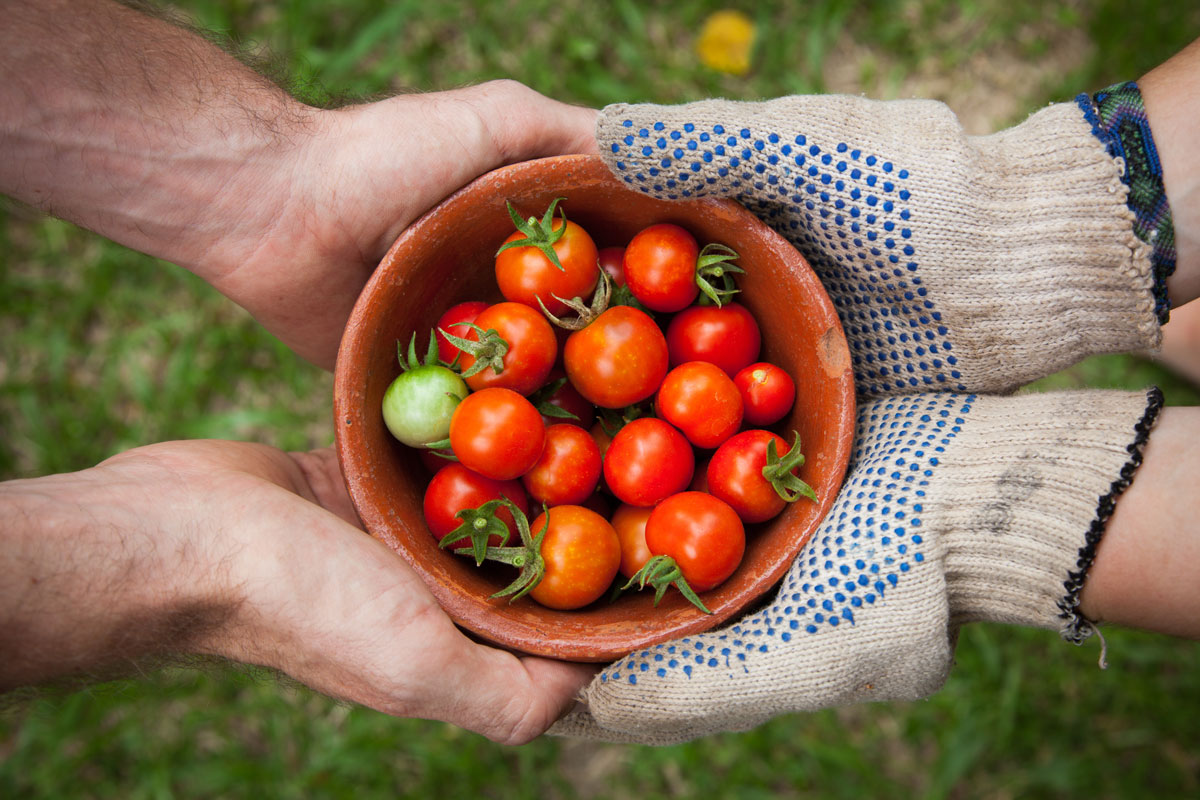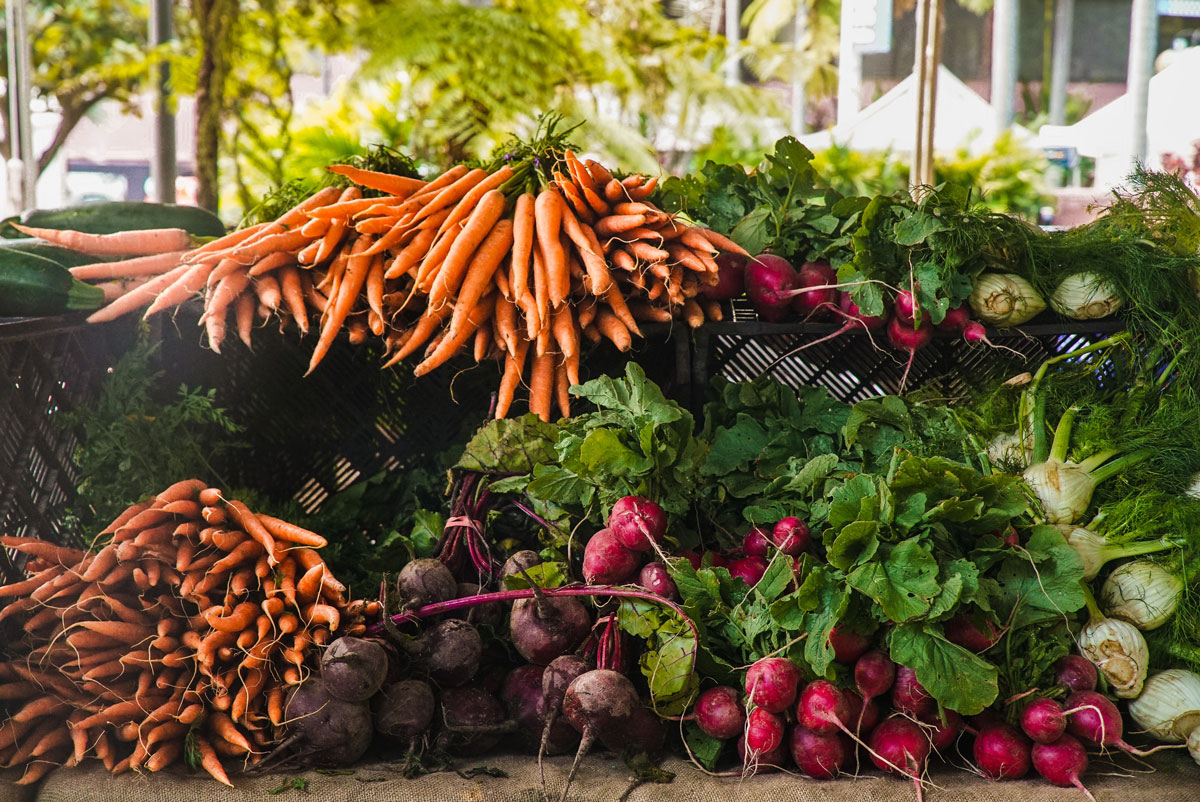Keeping the earth happy and healthy is just as important as keeping ourselves in great health. Everything we do, from the food we eat to the clothes we wear, has an impact on our planet. That’s why it’s important to make environmentally conscious decisions that will not only benefit our bodies, but the planet we call home.
The relationship between food and the earth
Food production
The process of producing food takes a toll on the environment because it uses energy and natural resources like water and land. While eating a plant-based diet can help the earth, consuming a lot of processed meat can be harmful to the environment. Research shows that the production of food accounts for 35% of global greenhouse gas emissions, where 57% of those emissions come from producing animal products, such as meat and dairy.
This is because raising animals for food takes up more water and land than growing plant-based foods. From feeding the animals to the manure and methane produced, the greenhouse gas emissions that result are much higher than plant-based foods.
In fact, foods such as vegetables, fruits, legumes, whole grains, and olive oil are said to have the lowest environmental impacts. One study estimated that if everyone in the world followed a vegan diet, the amount of land that farmers need to grow food globally would be reduced by 76% or 3.1 billion hectares! It takes fewer resources to make these plant foods, which then reduces greenhouse gases.
Food packaging
The materials used to package the various foods we buy at grocery stores and some fast-food restaurants also has an impact on the environment. In Canada, 3.3 million tonnes of plastic are discarded in landfills every year. And half of that is from plastic packaging. This includes water bottles, plastic straws, cutlery, grocery bags, wrappers, and more.
Additionally, the use of single-use plastics such as takeout containers, rubber gloves, and plastic shopping bags, increased during the COVID-19 pandemic. These are very hard to recycle and increase the amount of plastic pollution, making them harmful to the environment.
Although it may be difficult to eliminate packaging, there are other ways we can reduce our environmental impacts.
The earth-friendly diet
An earth-friendly diet is one that supports both humans and nature. This means foods such as nutritious fruits and vegetables that are grown sustainably on a farm without harmful pesticides, benefiting human health and the environment.
These foods should also be affordable, accessible, and minimize the risk of diet-related health conditions like cardiovascular disease, type 2 diabetes, and cancer. And to protect the environment, earth-friendly foods reduce greenhouse gas emissions, soil erosion, water use, and pollution. They also prioritize animal welfare and support biodiversity. When we take care of our own health by consuming healthy, naturally grown foods, we’re also helping our planet.
What can I do to be earth-friendly?
A diet that is rich in plant-based foods and low in animal foods is actually associated with better human and environmental health. Although meat and dairy have a negative impact on the environment, it may be difficult to cut them out of your diet once and for all.
So, limiting the amount of meat and dairy you consume and relying more heavily on fruits, vegetables, and plant proteins like legumes, grains, nuts, and seeds is a good first step. Scientists recommend the consumption of animal products in these amounts per week:
- Red meat – 3.5 oz (100 g)
- Poultry – 7.1 oz (200 g)
- Fish – 6.9 oz (200 g)
- Dairy – 61.6 oz (1.8 L)
When shopping for meat and dairy products, keep an eye out for labels like “organic” or “grass-fed”. In Canada, organic foods promote and enhance biodiversity, protect long-term soil health, and respect the ecological balance by using sustainable farming practices. They’ve also been proven to be healthier for us. The term “grass-fed” refers to livestock that has been raised on grass grown specifically for feeding animals (also known as pasture). Feeding livestock with grass is more nutritious for the animals and as a result, for humans consuming the animal products as well.
How can you live a more sustainable lifestyle?
Apart from adjusting your diet, there are many ways you can be more environmentally friendly. Here are some tips to get you started.
Avoid wasting food
Reducing your food waste is one of the easiest starting points for being more earth-friendly. It decreases greenhouse gas emissions, and as a result, your carbon footprint (the total amount of greenhouse gases generated by your individual actions).
That’s because the food that we throw away gets decomposed in landfills and emits methane, one of the most potent greenhouse gases. So, planning your meals for the day or even week, and saving leftovers for future meals can make a huge difference for the environment. This also helps you save on having to buy more than what you need!
Compost organic waste
Composting is a process where natural organic materials are converted into nutrient-rich soil. Some municipalities in Canada collect compost on a weekly or bi-weekly basis, along with garbage and recycling.
However, for those who live in areas without regular compost collection, there are ways to compost in your own backyard. One method you can try is cold or passive composting, where the organic matter is gradually broken down with the help of mother nature. Although this method is easy and low-maintenance, it may be a bit smelly since there aren’t as many rules to follow. It’s also good to keep in mind that cold composting works best with minimal organic waste. This method is great for those who are tight on time and don’t mind waiting a while for finished compost. If you prefer a more organized method of composting, you can try using a garden composter. Although this method needs more maintenance and specific temperature conditions, it yields compost faster.
Whether your city collects compost, or you choose to compost in your backyard, try to make a habit of collecting all your organic waste over the week in a “green bin” or compost bin. You can include anything from fruit and vegetable scraps to eggshells, coffee grounds, tea bags, and much more. Composting is a great way to make sure food waste doesn’t end up in landfills.
Eat more fibre-rich foods
Foods that are rich in fibre are not only healthy for our bodies, but also for the environment. One study found that the diets with the lowest amounts of greenhouse gas emissions were those high in fibre-rich plant foods and low in saturated fats and sodium.
Some examples of foods that have high fibre content include legumes, pears, strawberries, avocados, and apples. These foods also keep you full for a longer period of time and are great for your digestive health.
Human health and environmental health go hand in hand. So, start this Earth Day by taking care of yourself. Eat a nutritious diet filled with plant-based foods and limited meat and dairy. This will naturally help our planet earth feel healthy, happy and strong!
Do you have some eco-friendly practices that you’d like to share with us? Head over here and let us know!
Sources:
Can You Follow an Eco-Friendly Diet and Still Eat Meat?
How your food consumption impacts global environment
Green Mediterranean diet could be a ‘win-win’ for health and the planet
How food packaging waste contributes to plastic pollution
What Does a Sustainable Diet Look Like? Here’s What the Science Says
9 Nutrition Tips for Reducing Your Carbon Footprint
What Is Zero-Waste Cooking, and How Do You Do It?
The Ultimate Guide to Canadian Meat Labels








Leave A Comment